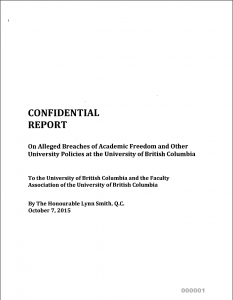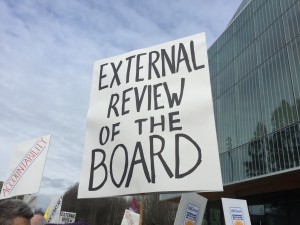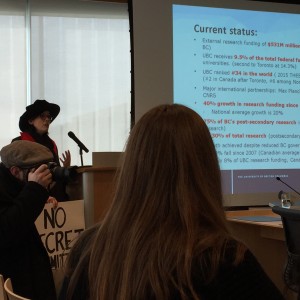Since University of B. C. President Arvind Gupta resigned unexpectedly last August, the institution’s managers and governors agreed to remain silent and move records and answers to non-disclosure agreements and privacy protection.
After five months of Freedom of Information requests, UBC released a partial disclosure of records related to Gupta’s resignation. One answer is implicit and explicit in the disclosure: if you want to know why UBC managers resist change, follow the money.
On the record, a rift formed between Gupta, the Dragon’s Den leader, and emotionally vulnerable middle managers. “You are deemed too quick to engage in debate in a confrontational or dismissive manner,” Gupta was scolded, “which is demoralising to a group of executives in fear of their employment security.” Gupta was not Presidential.
Off the record, there’s another storyline, perhaps more realistic.
One of the largest employers in British Columbia – $2.1 billion operating budget – the university and its Properties Trust have for years been given free passes in the court of accountability. This conceit percolates down through the ranks of middle management.
Gupta was hired in the fallout of serious financial fraud cases within the Faculties of Medicine and Dentistry. Controversies, such as the Sauder School of Business students’ rape chant in September 2013 had chipped away confidence in the ranks of management.
Senior campus administrators had seemingly looked the other way as internal investigations into management pointed to no one and nothing for accountability. The free pass for managers was status quo when Gupta was hired at UBC.
Three months in, Gupta targeted university finance and management for overhauls. The Vice President Finance was let go and the Provost was moved to an adviser’s post.
At this point, it began to look like a policy of administrator accountability had suddenly arrived on Point Grey. Administrative bloat and perks were finally called into question. The pushback was fierce as middle managers, deans, and their numerous assistants and associates, grew anxious and more insecure.
Stamping out fires, Gupta wrote on May 1 to the Chair of the Board of Governors: “Things seem to be going well with the Deans now (or at least I think so).” The doubt signalled that behind-the-scenes middle managers were conspiring under turf war conditions.
Accountability was pushed back up to the President: “we are still not certain that you fully appreciate the scope of your accountability,” Gupta was told in mid-May. “You must refrain from thinking controversial thoughts out loud.”
Gupta redirected priority to allocating finances to classrooms and hiring of faculty members, and away from bloated administrative ranks. For instance, the ranks of assistant and associate deans swelled from 47 in 2000 to 72 in 2015. Senior administrators and deans had long protected their prerogative of appointing at these managerial ranks and resisted even the slightest consideration of regulation through a proper hiring policy.
It didn’t matter to a balance of managers that Gupta was successful in attracting $66.5m in Federal research funding in late July. At the same time, he was called into meetings to answer to pushback. The Board formed an ad hoc committee to erode confidence. On August 7, he resigned.
Not one to rock a boat at a birthday party, Interim President Martha Piper stepped in to celebrate UBC’s 100th and restore business as usual and the free pass for management. Champagne corks were popping in September.
In December, Piper rushed the Board to once again approve student tuition increases across the campus. At the year’s major budget meeting in mid-January, with all the deans providing their faculty’s financial status and plans, the sole message to members of UBC was that the president said the ‘presentations were excellent.’ With deficits run up in the faculties, budgets are in a mess, but the PowerPoint slides are beautiful.
Of course arrogance, cronyism, and hubris have their limits, even at UBC. Since Gupta’s resignation, the university has bounced from one crisis to the next. The university is slipping again into a crisis of financial management. Why are managers resisting? Follow the money.
Stephen Petrina, Sandra Mathison, and E. Wayne Ross are Professors in the Faculty of Education at the University of British Columbia and co-directors of the Institute for Critical Education Studies.
 Follow
Follow




